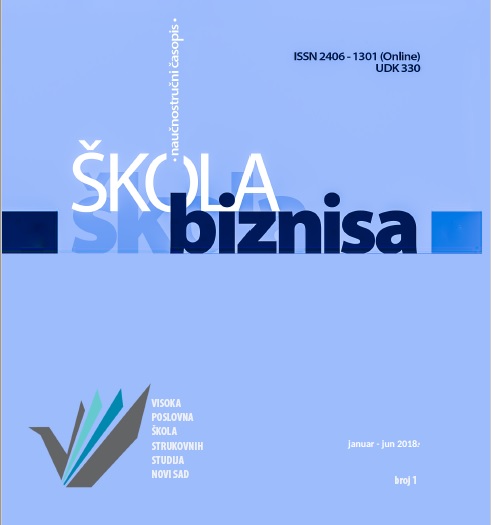TOURISM AS A DRIVING FORCE IN RURAL DEVELOPMENT: THE CASE STUDY OF SOUTHEASTERN BAČKA
Abstract
The goal of the study is to research the current state and the potential for development of tourism in Southeastern Bačka, defining the target segment of the market, as well as proposals for creating a tourism product and including the local community in an integrated development of tourism. Primary research for the study included electronic surveys conducted in Novi Sad and Zrenjanin, based on a sample of 322 respondents. It was essential to determine the target markets that can generate most visitors and tourists, followed by establishing which target market segment the marketing activities should be primarily focused on. The main goal of this research was to establish the steps that would contribute to activating recreational spaces and protected natural areas of Southeastern Bačka for tourism purposes.
References
Adeyinka-Ojo, S.F., Khoo-Lattimore, C., & Nair, V. (2014). A Framework for Rural Tourism Destination Management and Marketing Organisations. Procedia - Social and Behavioral Sciences, 144, 151-163.
Antić, A., Vujko, A., & Gajić, T. (2015). Tradicija kao pokretač razvoja turizma ruralnih destinacija, Škola biznisa, 2/2015, 9-20.
Antonsich, M. (2009). Regional Identity and Diversity in Europe. Experience in Wales, Silesia and Flanders. Progress in Human Geography, 33(1), 137-138.
Bălan, M., & Burghelea, C. (2015). Rural Tourism and its Implication in the Development of the Fundata Village. Procedia – Social and Behavioral Science, 188, 276-281.
Barkauskas, V., Barkauskienė, K., & Jasinskas, E. (2015). Analysis of Macro Environmental Factors Influencing the Development of Rural Tourism: Lithuanian Case. Procedia - Social and Behavioral Sciences, 213, 167-172.
Bornhorst, T., Ritchie, B., & Sheehan, L. (2010). Determinants of tourism success for DMOs & destinations: An empirical examination of stakeholders' perspectives. Tourism Management, 31(5), 572-589.
Brandth, B., & Haugen, M.S. (2011). Farm diversification into tourism – implications for social identity? Journal of Rural Studies, 27(1), 35-44.
Byrd, E.T., Bosley, H.E., & Dronberger, M.G. (2009). Comparisons of stakeholder perceptions of tourism impacts in rural eastern North Carolina. Tourism Management, 30(5), 693-703.
Cawley, M., & Gillmor, D.A. (2008). Integrated rural tourism: concepts and practice. Annals of Tourism Research, 35(2), 316-337.
Christou, P., Farmaki, A., & Evangelou, G. (2018). Nurturing nostalgia?: A response from rural tourism stakeholders, Tourism Management, 69, 42-51.
Demirović, D. (2016). Konkurentnost Vojvodine kao destinacije ruralnog turizma. (Doktorska disertacija). Novi Sad: Prirodno-matematički fakultet.
Forcan, D., Ivić, M., Đuranović, D., & Vuković, V. (2016). Održivi razvoj ruralnih područja - studije slučajeva Vojvodina-Srbija, Škola biznisa, 2/2016, 1-13.
Gao, J., & Wu, B. (2017). Revitalizing traditional villages through rural tourism: A case study of Yuanjia Village, Shaanxi Province, China, Tourism Management, 63, 223-233.
Kovačević, B. (2014). Turizam Šajkaške. (Doktorska disertacija). Novi Sad: Prirodno-matematički fakultet.
Kovačević, B., & Gajić, T. (2012). The research of tourist demand of sports and recreational activities in rural areas of Šajkaška. International Journal of Business and Management Tomorrow (IJBMT), 2(2), 1-11.
Kovačević Berleković, B., Pavlović, N., & Bošković, T. (2018). Child and youth tourism in function of rural development: case study of Southeast Bačka. In Hotelplan 2018, Hospitality as a quality factor of tourist destination offer and competitiveness (623-632). Beograd: The College of Hotel Management.
Nagai, H., Doering, A., & Yashima, Y. (2018). The emergence of the DMO concept in Japan: Confusion, contestation and acceptance. Journal of Destination Marketing & Management, 9, 377-380.
Paresishvili, O., Kvaratskhelia, L., & Mirzaeva, V. (2017). Rural tourism as a promising trend of small business in Georgia: Topicality, capabilities, peculiarities, Annals of Agrarian Science, 15(3), 344-348.
Petroman, C., Petroman I., Orbei, D., & Popescu, G. (2005). Activities generating new jobs in the rural area. In Proceedings from the second international scientific conference “Rural Development” (2019-221). Kaunas Lituania.
Salvatore, R., Chiodo, E., & Fantini, A. (2018). Tourism transition in peripheral rural areas: Theories, issues and strategies. Annals of Tourism Research, 68, 45-51.
Sharpley, R., & Vass, A. (2006). Tourism, farming and diversification: an attitudinal study, Tourism Management, 27(5), 1040-1052.
Vujko, A., Gajić, T., & Kovačević, B. (2012). Turizam u zaštićenim prirodnim prostorima – ekoturizam Fruške gore. Škola biznisa, 4/2012, 8-16.
Xue, L., Kerstetter, D., & Hint, C. (2017). Tourism development and changing rural identity in China. Annals of Tourism Research, 66, 170-182.
- Authors retain copyright and grant the journal right of first publication with the work simultaneously licensed under a Creative Commons Attribution License that allows others to share the work with an acknowledgement of the work's authorship and initial publication in this journal.
- Authors are able to enter into separate, additional contractual arrangements for the non-exclusive distribution of the journal's published version of the work (e.g., post it to an institutional repository or publish it in a book), with an acknowledgement of its initial publication in this journal.
- Authors are permitted and encouraged to post their work online (e.g., in institutional repositories or on their website) prior to and during the submission process, as it can lead to productive exchanges, as well as earlier and greater citation of published work (See The Effect of Open Access).

